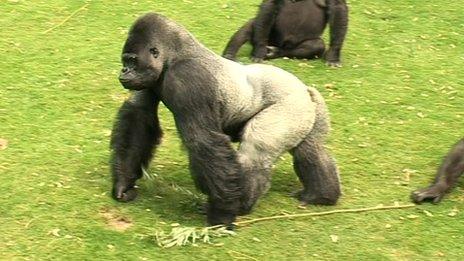Port Lympne's gorilla Djala returned to Gabon with family
- Published

A gorilla rescued from Africa after its parents were killed for bushmeat is being returned to Gabon with eight family members born in captivity.
Djala, a 440lb (200kg) silverback that has been at Port Lympne in Kent since the 1980s, left the park on Sunday.
The group, including females and Djala's young offspring, is being flown to Bateke Plateau National Park.
The Aspinall Foundation said it was the first time it had sent a full family group from captivity into the wild.
'Parents massacred'
Djala was saved by a French helicopter pilot, who spotted a group of children playing with the orphan.
"His parents had been massacred and probably eaten, so he was very lucky," said Amos Courage, the foundation's overseas director.
"He was taken back to Libreville and raised by a Frenchwoman who looked after him in her garden.
"When he got too big for the garden she asked the Aspinall foundation for help.
"He has bred 16 offspring so he has done his genetic duty.
"We feel he has done his time in captivity and he deserves a chance at life in the wild again."
The gorillas are being sedated for the journey, which involves two scheduled flights and another journey by a helicopter loaned by the president of the West African country.
'Short-term stress'
"There are risks but the big risks happen when they actually arrive," said Mr Courage.
"There will be a lot of short-term stress but it is not significant. The big danger lies in seeing how they adapt to the wild."
Phil Ridges, who manages the gorilla section at Port Lympne, will be working with a team of staff to help the gorillas acclimatise to their new life.
They will be monitored for about four months and given food to supplement what they can forage.
"Djala is the dominant male in the group and we hope he is going to lead his family off into the wild," said Mr Ridges.
"He is a fantastic father and really good with his females but he is not a massive people lover.
"I'm not his best mate - I have known him most of his life, but I am basically a minion to him."
The family is being released in an area where gorillas were hunted to extinction about 40 years ago.
The Aspinall Foundation has released 26 gorillas in Gabon and 25 in Congo since 1996 - 43 wild-born orphans and seven hand-reared animals born in captivity.
The aim is to re-establish viable populations in the wild.
"We will be sad to see him go but hopefully he will be going to better things," said Mr Ridges.
"Djala and his family going back is much better for the species than him staying in captivity."
- Published1 September 2023
- Published13 April 2013
- Published30 March 2013
- Published23 October 2012
- Published19 June 2012